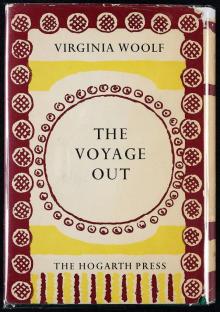- Home
- Virginia Woolf
Complete Works of Virginia Woolf Page 5
Complete Works of Virginia Woolf Read online
Page 5
“There’s my brother-in-law, Ambrose, the scholar (I daresay you’ve heard his name), his wife, my old friend Pepper, a very quiet fellow, but knows everything, I’m told. And that’s all. We’re a very small party. I’m dropping them on the coast.”
Mrs. Dalloway, with her head a little on one side, did her best to recollect Ambrose — was it a surname? — but failed. She was made slightly uneasy by what she had heard. She knew that scholars married any one — girls they met in farms on reading parties; or little suburban women who said disagreeably, “Of course I know it’s my husband you want; not me.”
But Helen came in at that point, and Mrs. Dalloway saw with relief that though slightly eccentric in appearance, she was not untidy, held herself well, and her voice had restraint in it, which she held to be the sign of a lady. Mr. Pepper had not troubled to change his neat ugly suit.
“But after all,” Clarissa thought to herself as she followed Vinrace in to dinner, “every one’s interesting really.”
When seated at the table she had some need of that assurance, chiefly because of Ridley, who came in late, looked decidedly unkempt, and took to his soup in profound gloom.
An imperceptible signal passed between husband and wife, meaning that they grasped the situation and would stand by each other loyally. With scarcely a pause Mrs. Dalloway turned to Willoughby and began:
“What I find so tiresome about the sea is that there are no flowers in it. Imagine fields of hollyhocks and violets in mid-ocean! How divine!”
“But somewhat dangerous to navigation,” boomed Richard, in the bass, like the bassoon to the flourish of his wife’s violin. “Why, weeds can be bad enough, can’t they, Vinrace? I remember crossing in the Mauretania once, and saying to the Captain — Richards — did you know him?— ‘Now tell me what perils you really dread most for your ship, Captain Richards?’ expecting him to say icebergs, or derelicts, or fog, or something of that sort. Not a bit of it. I’ve always remembered his answer. ‘Sedgius aquatici,’ he said, which I take to be a kind of duck-weed.”
Mr. Pepper looked up sharply, and was about to put a question when Willoughby continued:
“They’ve an awful time of it — those captains! Three thousand souls on board!”
“Yes, indeed,” said Clarissa. She turned to Helen with an air of profundity. “I’m convinced people are wrong when they say it’s work that wears one; it’s responsibility. That’s why one pays one’s cook more than one’s housemaid, I suppose.”
“According to that, one ought to pay one’s nurse double; but one doesn’t,” said Helen.
“No; but think what a joy to have to do with babies, instead of saucepans!” said Mrs. Dalloway, looking with more interest at Helen, a probable mother.
“I’d much rather be a cook than a nurse,” said Helen. “Nothing would induce me to take charge of children.”
“Mothers always exaggerate,” said Ridley. “A well-bred child is no responsibility. I’ve travelled all over Europe with mine. You just wrap ’em up warm and put ’em in the rack.”
Helen laughed at that. Mrs. Dalloway exclaimed, looking at Ridley:
“How like a father! My husband’s just the same. And then one talks of the equality of the sexes!”
“Does one?” said Mr. Pepper.
“Oh, some do!” cried Clarissa. “My husband had to pass an irate lady every afternoon last session who said nothing else, I imagine.”
“She sat outside the house; it was very awkward,” said Dalloway. “At last I plucked up courage and said to her, ‘My good creature, you’re only in the way where you are. You’re hindering me, and you’re doing no good to yourself.’”
“And then she caught him by the coat, and would have scratched his eyes out—” Mrs. Dalloway put in.
“Pooh — that’s been exaggerated,” said Richard. “No, I pity them, I confess. The discomfort of sitting on those steps must be awful.”
“Serve them right,” said Willoughby curtly.
“Oh, I’m entirely with you there,” said Dalloway. “Nobody can condemn the utter folly and futility of such behaviour more than I do; and as for the whole agitation, well! may I be in my grave before a woman has the right to vote in England! That’s all I say.”
The solemnity of her husband’s assertion made Clarissa grave.
“It’s unthinkable,” she said. “Don’t tell me you’re a suffragist?” she turned to Ridley.
“I don’t care a fig one way or t’other,” said Ambrose. “If any creature is so deluded as to think that a vote does him or her any good, let him have it. He’ll soon learn better.”
“You’re not a politician, I see,” she smiled.
“Goodness, no,” said Ridley.
“I’m afraid your husband won’t approve of me,” said Dalloway aside, to Mrs. Ambrose. She suddenly recollected that he had been in Parliament.
“Don’t you ever find it rather dull?” she asked, not knowing exactly what to say.
Richard spread his hands before him, as if inscriptions were to be read in the palms of them.
“If you ask me whether I ever find it rather dull,” he said, “I am bound to say yes; on the other hand, if you ask me what career do you consider on the whole, taking the good with the bad, the most enjoyable and enviable, not to speak of its more serious side, of all careers, for a man, I am bound to say, ‘The Politician’s.’”
“The Bar or politics, I agree,” said Willoughby. “You get more run for your money.”
“All one’s faculties have their play,” said Richard. “I may be treading on dangerous ground; but what I feel about poets and artists in general is this: on your own lines, you can’t be beaten — granted; but off your own lines — puff — one has to make allowances. Now, I shouldn’t like to think that any one had to make allowances for me.”
“I don’t quite agree, Richard,” said Mrs. Dalloway. “Think of Shelley. I feel that there’s almost everything one wants in ‘Adonais.’”
“Read ‘Adonais’ by all means,” Richard conceded. “But whenever I hear of Shelley I repeat to myself the words of Matthew Arnold, ‘What a set! What a set!’”
This roused Ridley’s attention. “Matthew Arnold? A detestable prig!” he snapped.
“A prig — granted,” said Richard; “but, I think a man of the world. That’s where my point comes in. We politicians doubtless seem to you” (he grasped somehow that Helen was the representative of the arts) “a gross commonplace set of people; but we see both sides; we may be clumsy, but we do our best to get a grasp of things. Now your artists find things in a mess, shrug their shoulders, turn aside to their visions — which I grant may be very beautiful — and leave things in a mess. Now that seems to me evading one’s responsibilities. Besides, we aren’t all born with the artistic faculty.”
“It’s dreadful,” said Mrs. Dalloway, who, while her husband spoke, had been thinking. “When I’m with artists I feel so intensely the delights of shutting oneself up in a little world of one’s own, with pictures and music and everything beautiful, and then I go out into the streets and the first child I meet with its poor, hungry, dirty little face makes me turn round and say, ‘No, I can’t shut myself up — I won’t live in a world of my own. I should like to stop all the painting and writing and music until this kind of thing exists no longer.’ Don’t you feel,” she wound up, addressing Helen, “that life’s a perpetual conflict?” Helen considered for a moment. “No,” she said. “I don’t think I do.”
There was a pause, which was decidedly uncomfortable. Mrs. Dalloway then gave a little shiver, and asked whether she might have her fur cloak brought to her. As she adjusted the soft brown fur about her neck a fresh topic struck her.
“I own,” she said, “that I shall never forget the Antigone. I saw it at Cambridge years ago, and it’s haunted me ever since. Don’t you think it’s quite the most modern thing you ever saw?” she asked Ridley. “It seemed to me I’d known twenty Clytemnestras. Old Lady Ditchling for one. I don’t know a word of
Greek, but I could listen to it for ever—”
Here Mr. Pepper struck up:
πολλἀ τἀ δεινά, κοὐδἑν ἀν-
θρώπου δεινότερον πέλει.
τοῦτο καί πολιοῦ πέραν
πόντου χειμερίῳ νότῳ
χωρεῖ, περιβρυχίοισι
περῶν ὑπ´ οῐδμασι
Mrs. Dalloway looked at him with compressed lips.
“I’d give ten years of my life to know Greek,” she said, when he had done.
“I could teach you the alphabet in half an hour,” said Ridley, “and you’d read Homer in a month. I should think it an honour to instruct you.”
Helen, engaged with Mr. Dalloway and the habit, now fallen into decline, of quoting Greek in the House of Commons, noted, in the great commonplace book that lies open beside us as we talk, the fact that all men, even men like Ridley, really prefer women to be fashionable.
Clarissa exclaimed that she could think of nothing more delightful. For an instant she saw herself in her drawing-room in Browne Street with a Plato open on her knees — Plato in the original Greek. She could not help believing that a real scholar, if specially interested, could slip Greek into her head with scarcely any trouble.
Ridley engaged her to come to-morrow.
“If only your ship is going to treat us kindly!” she exclaimed, drawing Willoughby into play. For the sake of guests, and these were distinguished, Willoughby was ready with a bow of his head to vouch for the good behaviour even of the waves.
“I’m dreadfully bad; and my husband’s not very good,” sighed Clarissa.
“I am never sick,” Richard explained. “At least, I have only been actually sick once,” he corrected himself. “That was crossing the Channel. But a choppy sea, I confess, or still worse, a swell, makes me distinctly uncomfortable. The great thing is never to miss a meal. You look at the food, and you say, ‘I can’t’; you take a mouthful, and Lord knows how you’re going to swallow it; but persevere, and you often settle the attack for good. My wife’s a coward.”
They were pushing back their chairs. The ladies were hesitating at the doorway.
“I’d better show the way,” said Helen, advancing.
Rachel followed. She had taken no part in the talk; no one had spoken to her; but she had listened to every word that was said. She had looked from Mrs. Dalloway to Mr. Dalloway, and from Mr. Dalloway back again. Clarissa, indeed, was a fascinating spectacle. She wore a white dress and a long glittering necklace. What with her clothes, and her arch delicate face, which showed exquisitely pink beneath hair turning grey, she was astonishingly like an eighteenth-century masterpiece — a Reynolds or a Romney. She made Helen and the others look coarse and slovenly beside her. Sitting lightly upright she seemed to be dealing with the world as she chose; the enormous solid globe spun round this way and that beneath her fingers. And her husband! Mr. Dalloway rolling that rich deliberate voice was even more impressive. He seemed to come from the humming oily centre of the machine where the polished rods are sliding, and the pistons thumping; he grasped things so firmly but so loosely; he made the others appear like old maids cheapening remnants. Rachel followed in the wake of the matrons, as if in a trance; a curious scent of violets came back from Mrs. Dalloway, mingling with the soft rustling of her skirts, and the tinkling of her chains. As she followed, Rachel thought with supreme self-abasement, taking in the whole course of her life and the lives of all her friends, “She said we lived in a world of our own. It’s true. We’re perfectly absurd.”
“We sit in here,” said Helen, opening the door of the saloon.
“You play?” said Mrs. Dalloway to Mrs. Ambrose, taking up the score of Tristan which lay on the table.
“My niece does,” said Helen, laying her hand on Rachel’s shoulder.
“Oh, how I envy you!” Clarissa addressed Rachel for the first time. “D’you remember this? Isn’t it divine?” She played a bar or two with ringed fingers upon the page.
“And then Tristan goes like this, and Isolde — oh! — it’s all too thrilling! Have you been to Bayreuth?”
“No, I haven’t,” said Rachel. `”Then that’s still to come. I shall never forget my first Parsifal — a grilling August day, and those fat old German women, come in their stuffy high frocks, and then the dark theatre, and the music beginning, and one couldn’t help sobbing. A kind man went and fetched me water, I remember; and I could only cry on his shoulder! It caught me here” (she touched her throat). “It’s like nothing else in the world! But where’s your piano?” “It’s in another room,” Rachel explained.
“But you will play to us?” Clarissa entreated. “I can’t imagine anything nicer than to sit out in the moonlight and listen to music — only that sounds too like a schoolgirl! You know,” she said, turning to Helen, “I don’t think music’s altogether good for people — I’m afraid not.”
“Too great a strain?” asked Helen.
“Too emotional, somehow,” said Clarissa. “One notices it at once when a boy or girl takes up music as a profession. Sir William Broadley told me just the same thing. Don’t you hate the kind of attitudes people go into over Wagner — like this—” She cast her eyes to the ceiling, clasped her hands, and assumed a look of intensity. “It really doesn’t mean that they appreciate him; in fact, I always think it’s the other way round. The people who really care about an art are always the least affected. D’you know Henry Philips, the painter?” she asked.
“I have seen him,” said Helen.
“To look at, one might think he was a successful stockbroker, and not one of the greatest painters of the age. That’s what I like.”
“There are a great many successful stockbrokers, if you like looking at them,” said Helen.
Rachel wished vehemently that her aunt would not be so perverse.
“When you see a musician with long hair, don’t you know instinctively that he’s bad?” Clarissa asked, turning to Rachel. “Watts and Joachim — they looked just like you and me.”
“And how much nicer they’d have looked with curls!” said Helen. “The question is, are you going to aim at beauty or are you not?”
“Cleanliness!” said Clarissa, “I do want a man to look clean!”
“By cleanliness you really mean well-cut clothes,” said Helen.
“There’s something one knows a gentleman by,” said Clarissa, “but one can’t say what it is.”
“Take my husband now, does he look like a gentleman?”
The question seemed to Clarissa in extraordinarily bad taste. “One of the things that can’t be said,” she would have put it. She could find no answer, but a laugh.
“Well, anyhow,” she said, turning to Rachel, “I shall insist upon your playing to me to-morrow.”
There was that in her manner that made Rachel love her.
Mrs. Dalloway hid a tiny yawn, a mere dilation of the nostrils.
“D’you know,” she said, “I’m extraordinarily sleepy. It’s the sea air. I think I shall escape.”
A man’s voice, which she took to be that of Mr. Pepper, strident in discussion, and advancing upon the saloon, gave her the alarm.
“Good-night — good-night!” she said. “Oh, I know my way — do pray for calm! Good-night!”
Her yawn must have been the image of a yawn. Instead of letting her mouth droop, dropping all her clothes in a bunch as though they depended on one string, and stretching her limbs to the utmost end of her berth, she merely changed her dress for a dressing-gown, with innumerable frills, and wrapping her feet in a rug, sat down with a writing-pad on her knee. Already this cramped little cabin was the dressing room of a lady of quality. There were bottles containing liquids; there were trays, boxes, brushes, pins. Evidently not an inch of her person lacked its proper instrument. The scent which had intoxicated Rachel pervaded the air. Thus established, Mrs. Dalloway began to write. A pen in her hands became a thing one caressed pape
r with, and she might have been stroking and tickling a kitten as she wrote:
Picture us, my dear, afloat in the very oddest ship you can imagine. It’s not the ship, so much as the people. One does come across queer sorts as one travels. I must say I find it hugely amusing. There’s the manager of the line — called Vinrace — a nice big Englishman, doesn’t say much — you know the sort. As for the rest — they might have come trailing out of an old number of Punch. They’re like people playing croquet in the ‘sixties. How long they’ve all been shut up in this ship I don’t know — years and years I should say — but one feels as though one had boarded a little separate world, and they’d never been on shore, or done ordinary things in their lives. It’s what I’ve always said about literary people — they’re far the hardest of any to get on with. The worst of it is, these people — a man and his wife and a niece — might have been, one feels, just like everybody else, if they hadn’t got swallowed up by Oxford or Cambridge or some such place, and been made cranks of. The man’s really delightful (if he’d cut his nails), and the woman has quite a fine face, only she dresses, of course, in a potato sack, and wears her hair like a Liberty shopgirl’s. They talk about art, and think us such poops for dressing in the evening. However, I can’t help that; I’d rather die than come in to dinner without changing — wouldn’t you? It matters ever so much more than the soup. (It’s odd how things like that do matter so much more than what’s generally supposed to matter. I’d rather have my head cut off than wear flannel next the skin.) Then there’s a nice shy girl — poor thing — I wish one could rake her out before it’s too late. She has quite nice eyes and hair, only, of course, she’ll get funny too. We ought to start a society for broadening the minds of the young — much more useful than missionaries, Hester! Oh, I’d forgotten there’s a dreadful little thing called Pepper. He’s just like his name. He’s indescribably insignificant, and rather queer in his temper, poor dear. It’s like sitting down to dinner with an ill-conditioned fox-terrier, only one can’t comb him out, and sprinkle him with powder, as one would one’s dog. It’s a pity, sometimes, one can’t treat people like dogs! The great comfort is that we’re away from newspapers, so that Richard will have a real holiday this time. Spain wasn’t a holiday. . . .

 Three Guineas
Three Guineas Flush
Flush Mrs. Dalloway
Mrs. Dalloway The Voyage Out
The Voyage Out A Writer's Diary: Being Extracts From the Diary of Virginia Woolf
A Writer's Diary: Being Extracts From the Diary of Virginia Woolf To The Lighthouse
To The Lighthouse Night and Day
Night and Day Monday or Tuesday
Monday or Tuesday Complete Works of Virginia Woolf
Complete Works of Virginia Woolf Orlando
Orlando Genius and Ink
Genius and Ink Mrs. Dalloway (Annotated)
Mrs. Dalloway (Annotated) Jacob's Room
Jacob's Room THE RUSSIAN POINT OF VIEW
THE RUSSIAN POINT OF VIEW A Writer's Diary
A Writer's Diary Woolf Short Stories
Woolf Short Stories